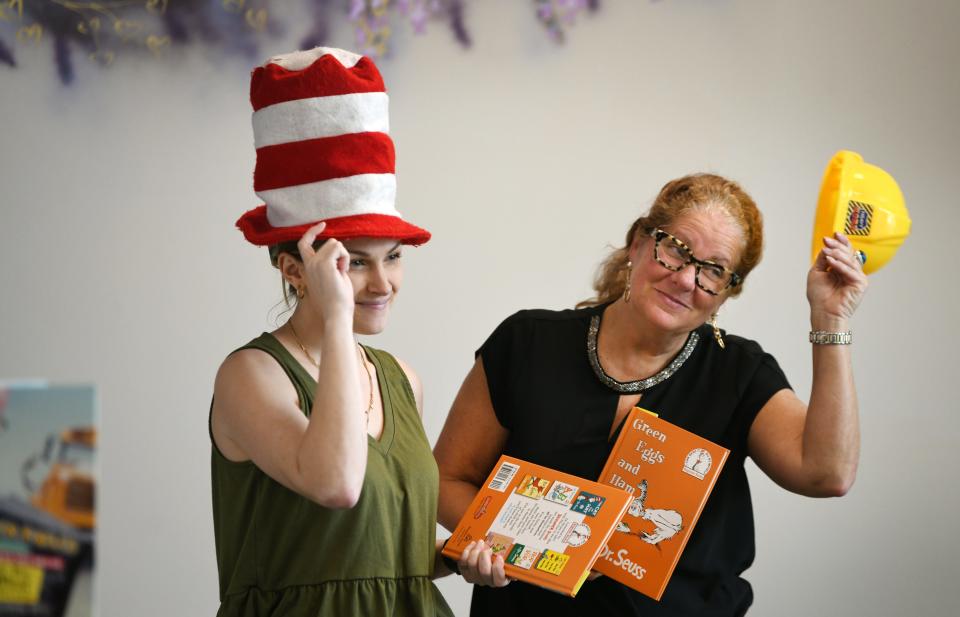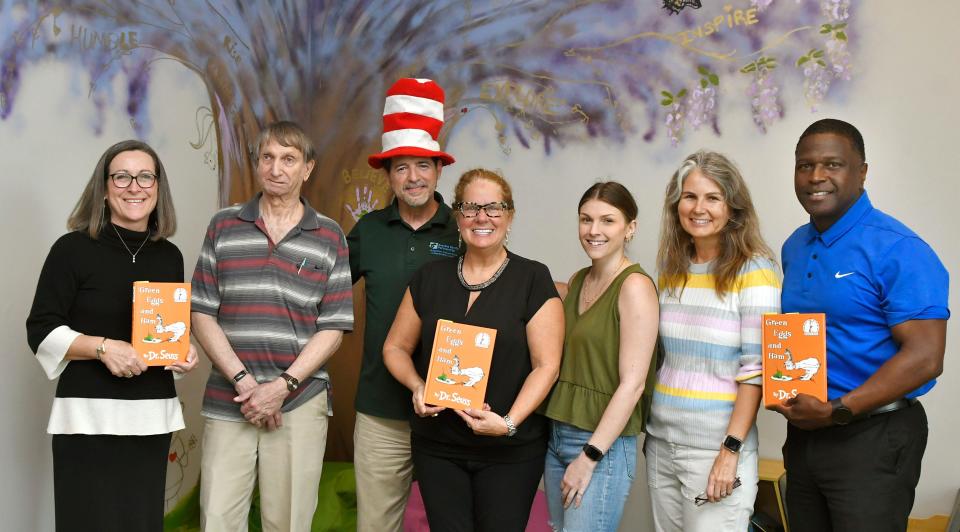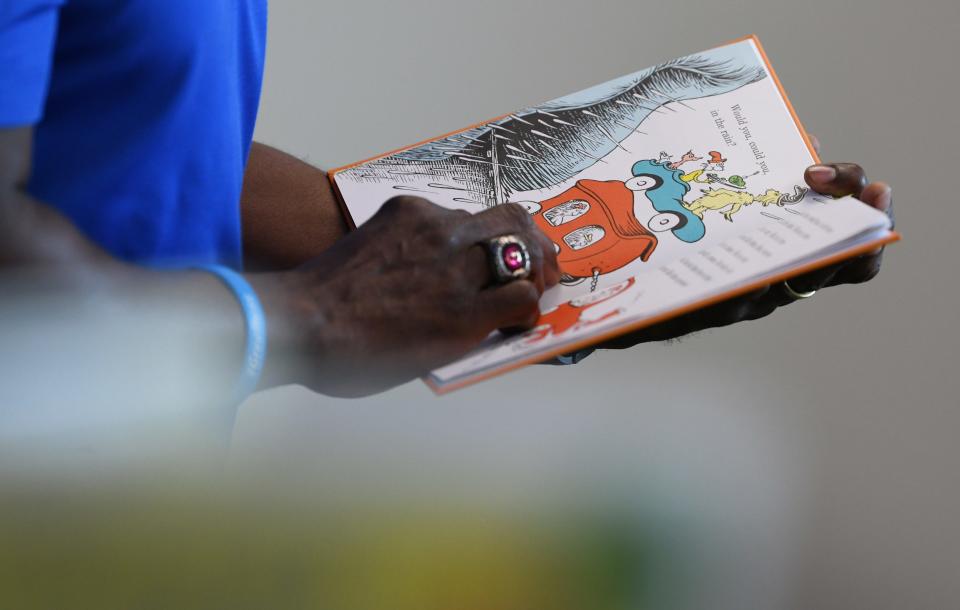From Cats in Hats to Whos in Whoville, the Seuss legacy lives on | Opinion
- Oops!Something went wrong.Please try again later.
Theodor Geisel, aka Dr. Seuss, is known for writing most of his popular children’s books in “anapestic tetrameter,” an extremely fancy way of saying he gave us fun, easy-to-read books.
It’s comforting, I think, that most everyone on either side of the median age line in the United States is familiar with Geisel’s works like “The Cat in the Hat,” “Green Eggs and Ham” or “The Lorax.” And "How the Grinch Stole Christmas" is a classic TV cartoon right up there with “A Charlie Brown Christmas.”
For many years now, March has been celebrated as National Reading Month, in honor of Dr. Seuss’ birthday. (Geisel was born March 2, 1904.) Seems fair because his books have sold more than 700 million copies globally and are often some of the first books children learn to read. Maybe it’s because they’re fun to look at and silly sounding to their ears when read out loud.

Like most people, Geisel gets a bit complicated the more you dig into his life, shaped by the times and historic moments of his day. In 2021 his estate, Dr. Seuss Enterprises, stopped publishing and licensing six of his books for "portraying people in ways that are hurtful and wrong." You can see some of that, particularly with his drawings of Asian characters — the stereotypical squinty eyes, exaggerated front teeth, etc. — during his crusade against Japan, and Emperor Hirohito, in World War II.
In a sense, Dr. Seuss Enterprises canceled their own, which seems OK since they’re in charge of his works and plotted the cultural calculus of Geisel, measuring the distasteful of some of his work wit the overall good. Seems fair.
More from Wayne Price How hard should you take your team's loss? | Opinion
Maybe "cool" didn't die with Steve McQueen after all | Opinion
However, it’s important to square his discontinued work against his devout outspokenness against racism and antisemitism early in his career when such things weren’t so chic. Also, Geisel bravely took on American hero aviator Charles Lindbergh, who reportedly joined a campaign to “protect the white race” prior to World War II and even flew to Germany before World War II to receive in person a medal from Hermann Goring, the commander of Nazi Germany’s Luftwaffe. Geisel was a big supporter of entering the war against Japan and Germany.
But that’s all adult stuff. It’s more enjoyable to focus on his impact on children and reading.
Earlier this week a handful of community leaders gather at the Early Learning Coalition of Brevard County to read “Green Eggs & Ham.” A few reminisced about how Dr. Seuss provided them entry into reading.
Laura Gambino, CEO of the Early Learning Coalition, noted the earlier one starts reading, the better.
“Reading to your child for 20 minutes every day not only fosters a love for reading, but for success far beyond the pages of a story book,” Gambino said.
“Eighty percent of an individual’s brain development occurs by age 3, so we urge you to implement the importance of reading into your daily routine.”
One of the readers, Phil Scarpelli, the CEO of Brevard Family Partnership, held “Green Eggs and Ham,” and said “This is my childhood reinvented. I just love it.”
Scarpelli isn’t alone.
Used to be if were a kid seeing the physician, the first doctor that made you smile in the waiting room was Dr. Seuss. His books rhymed. They were whimsical. And they had just enough subtle wit that expertly mixed morality with a little orneriness by that long-faced, goofy-smiling feline donning a candy-cane colored hat and red bowtie.

And if you don’t get a little weepy-eyed thinking about a parent, or grandparent, reading you or your kids a Dr. Seuss book, well, you're a bigger person than I.
Remember what the good doctor once said: “Don’t cry because it’s over, smile because it happened.”
To learn more about the Early Learning Coalition of Brevard, or to volunteer or donate, go to Early Learning Coalition of Brevard County (elcbrevard.org)
5 things about Geisel you might not know:
We might not have Dr. Seuss if not for alcohol.
A student at Dartmouth College, Geisel was busted for drinking gin with some buddies in his room. Because it was during Prohibition, it was a big deal. Dartmouth’s dean punished him by making him resign as editor of the college humor magazine, the Dartmouth Jack-O-Lantern.
As a work-around to keep his job with the Jack-O-Lantern, Geisel began using the pen name "Seuss," his mother’s maiden name. Later in his career, he added a “Dr.” honorific when signing his work.
Ironically, Geisel wasn’t that fond of children, at least for himself.
Geisel and his wife never had children, even though he earned fame and fortune writing and illustrating children’s books. He reportedly commented on the irony, saying to parents with children: "You have 'em; I'll entertain 'em.”
Environmentalists say “Horton Hears a Who” is an allegory that neatly fits with those who deny changing climate woes. Pro-life advocate said it speaks to the preciousness of individuals no matter how small. Maybe. But neither was the book’s intent.
“Horton Hears a Who” was based on post=World War II Japan’s rebuilding efforts, and Geisel’s remorse for supporting the forced internment of Japanese Americans after the attack on Pearl Harbor. In fact, Geisel dedicated the book to a Japanese friend.

Brevity was a key to Giesel’s success.
Maybe it’s apocryphal, but the story goes that Giesel’s publisher at Houghton Mifflin challenged him to write a “can’t-put-down” children’s book using only 225 different words from a list of 348. It was an effort to get more children interested in reading.
The result? “The Cat in the Hat.”
Many people have their Dr. Seuss favorite, but here are the Top 5 best sellers, according to Publishers Weekly.
No. 1 is “Green Eggs and Ham,” followed by “The Cat in the Hat,” “One Fish, Two Fish, Red Fish, Blue Fish,” “Hop on Pop,” and “Oh, the Places You’ll Go.”
Wayne T. Price is director of communications at the Space Coast Health Foundation and a former staffer at FLORIDA TODAY.
This article originally appeared on Florida Today: From Cats in Hats to Whos in Whoville, the Seuss legacy lives on

